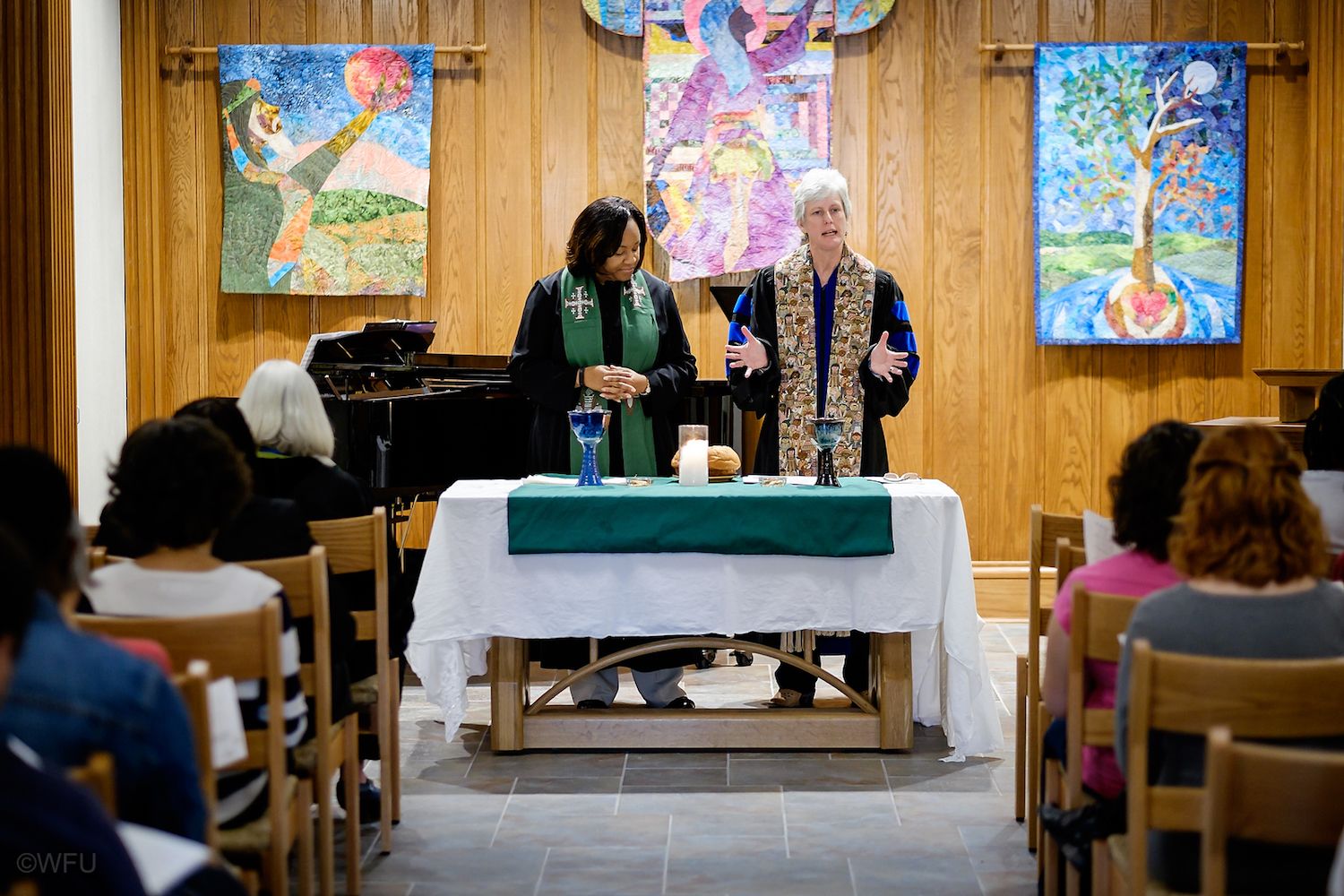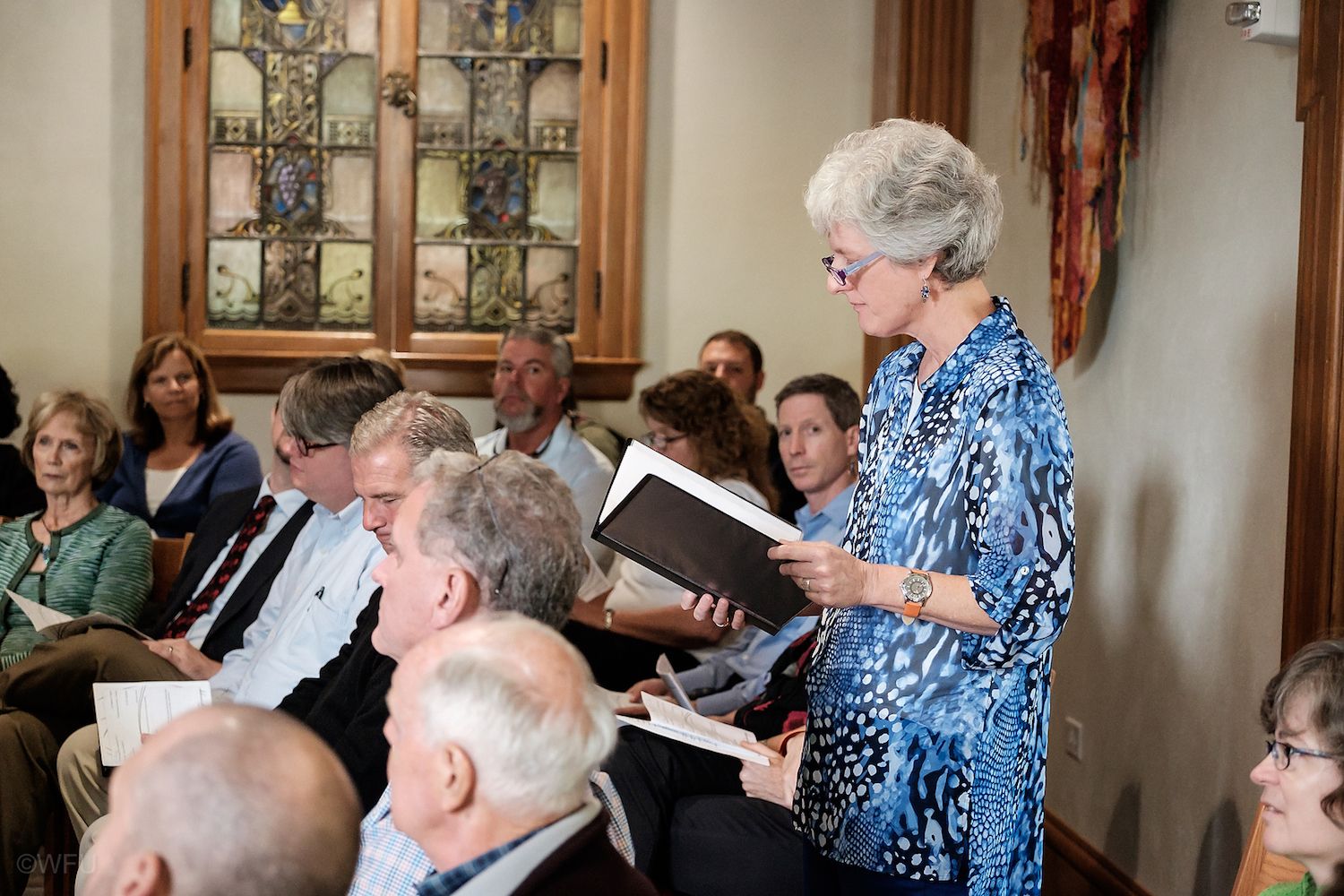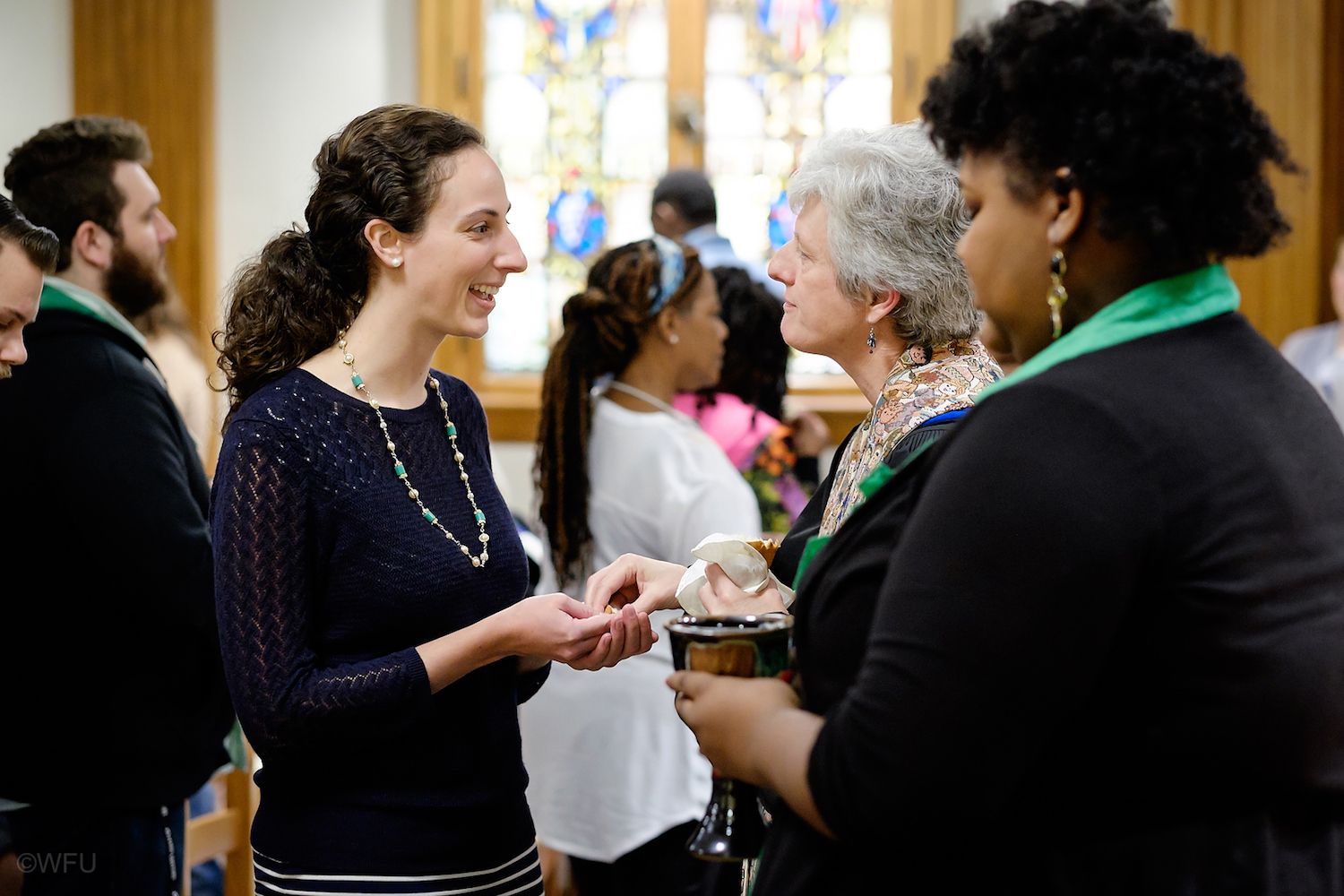“I love Wake Forest.” Dr. Jill Crainshaw (’84), tucked into her favorite, fireside corner of a local cafe, takes another sip of coffee, then leans forward in her chair, hands animated. “I feel enormous gratitude for the way the University and my students have shaped me …”
Crainshaw suddenly pauses, her expression bemused. “This doesn’t sound like me at all, does it?”
She’s right. Crainshaw, the School of Divinity’s Blackburn Professor of Worship and Liturgy, is famous among students for her no-nonsense attitude, self-described aversion to hugs and her dry wit. But as Christie Dalton (MDiv ’11), former student and now colleague of Crainshaw’s, reveals, “I suppose that people who haven’t seen Jill at work in the classroom might think she is too reserved to create deep connections. Nothing could be further from the truth.”

'No student in my classes will preside at the Communion table without knowing how to make bread,' says the Rev. Dr. Jill Crainshaw, right.
Certainly, as Crainshaw delves deeper into conversation about her history with Wake Forest, her love for the school is clearly and enthusiastically evident. “I’ve been committed to the University for a long time,” she explains, smiling.
Crainshaw arrived at Wake in 1980 from Kannapolis, North Carolina, as a first-generation college student. After making a rainy-day tour of the campus a few months earlier she had decided that she, a Lutheran in the midst of a then-still-Baptist culture, would be engaging in something a bit radical in her choice of Wake Forest. Yet before her four years were over — during which time she earned a BA in religion under the mentorship of Professor Fred Horton — she became a Baptist herself.
Between 1984 and 1999 she earned a Master’s of Divinity degree from Southeastern Baptist Theological Seminary, became ordained as a Baptist minister, then received her Ph.D. in preaching and worship from the Presbyterian Church-USA’s Union Theological Seminary in Richmond.
“Yes, I then became a Presbyterian minister,” she laughs — and what followed was the next surprising bend in her journey. “I was invited to become the internship program director for the Divinity School in its inaugural year [1999],” Crainshaw says. “I was drawn to the vision for the Divinity School but I also felt like it was an opportunity to give back to Wake Forest, which had been so formative for me.”
She’s thoughtful for a few moments, then adds, “When I was an undergrad, my roommate and I ate the same thing in the Pit every day because of Leah, the cafeteria worker and her kindness. And I’ve gone to the campus bookstore nearly every day since I returned in 1999 — the folks there always have time to offer a ‘Good Morning,’ and I feel so grateful for that. I want to return my gratitude to the community.
That gratitude has been instrumental in shaping not only Crainshaw’s vocational journey as minister and professor but also as a social justice advocate of clean water, both in her role on campus — most especially with the divinity school’s Food, Health and Ecological Well-Being program — and in the local community. “When I was a Baptist minister in Virginia, I baptized my congregation members in the river — because water is life. God gave it to us in its fullness, shaping it out of all the beautiful things around us. And that is deserving of our gratitude,” she says. “Everything comes back to gratitude, which is a prophetic act. The Gospel’s call to justice-making and our incarnations of gratitude are connected. You move people toward social justice by having them tap into gratitude.”
The sacraments are also an essential focus of Crainshaw’s theology. “I became Presbyterian,” she says, “because I am essentially a sacramental theologian. I believe that everyday life — each moment — is drenched in spirit and mystery and the sacred. Worship enables us to build a bridge to everyday sacramentality.”
Fred Bahnson, director of the Food, Health and Ecological Well-Being Program, concurs. “Jill brings to her teaching and scholarship a deeply sacramental view of the world. When she teaches her students about baptism, she takes them to a local creek and a water treatment plant. She helps them see that both the human and nonhuman world are infused with God’s glory and inspired by God’s breath, and that through liturgy we can better see that God is always present.”
Crainshaw is also an outspoken champion for sustainable food systems. Bread, for her, is perhaps the deepest symbol of everyday sacramentality. “No student in my classes will preside at the Communion table without knowing how to make bread,” she says. Crainshaw regularly assigns students the task of baking bread, after which they — often first-time bakers — gather and share their stories from the kitchen.
Monica Banks (MDiv ’17), a former restaurateur, says, “For me, any bread is sacred. Dr. Crainshaw would allow me to share my experiences in baking bread and the spiritual sacramentality that bread-making was for me. She knows bread intimately: the spores, the process itself — the ‘divine mystery of bread,’ she likes to call it.”
For Crainshaw, the sharing of those experiences — the stories themselves — is an equally important, and sacred, aspect of the teaching. “Wisdom is essentially how to make it through the world — the bits and pieces your grandmother tells you that open up into a story,” she says. “Stories contain wisdom. Wisdom is birthed in the community and returns to the community.”
Just like herself?
Crainshaw considers this for a moment and laughs. “That’s just got to be a Wake Forest thing.”
Karen Richardson Dunn is a Double Deacon (BA English, 1986; MDiv, 2011) and an ordained minister with the United Church of Christ. She is the program coordinator for the Wake Forest School of Divinity Food, Health and Ecological Well-Being Program and facilitator for the Creation Justice Network of the UCC’s Southern Conference. She is a professional writer and editor and lives in Asheville, North Carolina.




